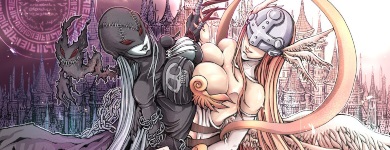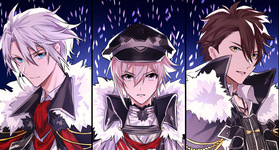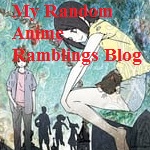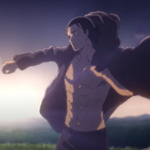Oh god dammit. Suddenly, I love this show so much.
Where do I start...The constant imagery of children in the park followed by the old couple was really telling of the frame of mind both Wil and Allison were in, though in two different ways. While Allison was looking forward to those things, Wil was in regrets over what he could be missing. Very seldom will an anime have their main characters couple up, and if they do, it would be by the end of the anime. As a matter of fact, usually it would be by the end of a war if that were the type of setting. Not only does this anime officially end its war in 4 episodes, it also has their main characters marry by the halfway point.
I also have to take back my previous concerns over the show overlooking the complexities of war. It's now taking its time in dealing with the issues of people whom profit off of war, as well as those that still harbor resentment at the other country. Because Wil has had a direct hand in ending the war, he also feels a responsibility in seeing the scenario through. However, he also wants to be with Allison, and though he post-justifies his actions as protecting her, he's still trying to follow his own path in life. It's quite meaningful when Allison's father remarks at him being a horrible father, as when you take a step back, you'd realize that Wil is also his son, so Allison's father is failing them both.
Also, I don't think I've ever seen this before in any form of media. Allison was pregnant, but in the scene where Wil says that he has to leave, any other form of media would have had that be a huge crying scene, or at least have that be a huge blow up point with lots of drama. It's instead treated as...something really ambiguous. It's not a happy moment, but it's not a sad moment either. It's a tragic situation where both of them came to a compromise in their minds. Allison never got to tell Wil about their child, and even at the end she was still being supportive. I understand that revealing her pregnancy would absolutely prevent Wil from leaving, preventing Allison from saying anything since she didn't want to chain him down, but still. In some respects, I can see someone really harking on at Wil for being a horrible person, but as it's written, it instead paints Allison as an impossible person. There's no way someone could be that supportive, patient, nor forgiving short of an outright Saint. At the very least, in terms of media, it's a low-hanging fruit to grasp at this chance for drama. The characters here don't overact. Heck, they don't even react dramatically. They're both distraught, but they're both putting on a face to both hide their pain and, at a meta level, prevent any singular scene from getting drawn out. In part, the scenes moved really fast, almost to the point where there wasn't enough time to absorb all the events happening. In another sense, the drama weren't in the singular events, but the sum of events that both Wil and Allison have experienced together.
Instead, we have a lot of smart moves here. The narration switches to Lillia, whose name is based on the town of Lilliane - a really small implied detail early on. It also marks the change of main characters after Wil leaves. The use of the plants to show the change of time in addition to Lillia's age. The portrait of Allison and Wil, where Wil's face is blurred out. There are no photos of Allison's father since he works in intelligence, therefore a blurred out photo works to both obscure Wil's face, preserve his memory, and serve as a running joke and reminder of him being obtuse. The fact that Lillia is more similar to Wil than Allison, down to the fact that she has to look after her mother. The fakeout where we're led to believe Allison got another boyfriend, but it turns out that it was actually Wil. This is signified by him burning himself on his tea, which then hearkens back to the repeated tea scenes throughout the show. Those scenes served as a landing point where the characters can return to a familiar setting despite them being older and in a different location. It affirms that no matter where they are or how much has happened, they're still the same at heart.
I still question why Allison's father had to ask Wil of all people to help. Was there not any other qualified individuals? Why would he deprive his daughter of her husband after he himself left Allison behind? Also, does Wil truly love Allison? Throughout the entire show, he's been following her and has been oblivious to her feelings. Perhaps he has been in denial or been avoiding the topic, but regardless, due to the shortness of the first half, perhaps there was a lot removed pertaining to his feelings, as well as the lead up to his decision to leave. Even still, why didn't Wil refuse? He's been curious about Sou Beil and has been concerned with the relationship between the two countries for the longest time, but how is he personally obligated to partake in further political chaos?
Still, the positive qualities of the episode overshadowed my qualms, as seeing all these come together really got to me. I'm really enjoying myself here. |















